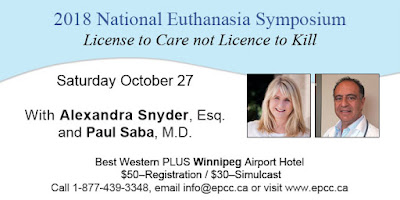Executive Director - Euthanasia Prevention Coalition
The New Jersey legislature may vote on a bill to legalize assisted suicide in October. According to News 12 New Jersey, Assembly Bill 1504, which is sponsored by Assemblyman John Burzichelli is expected to be voted on in October. News 12 reported that Gov. Phil Murphy has expressed support for the assisted suicide bill.
The bill, that is called Aid in Dying for the Terminally Ill Act, gives doctors the right in law to prescribe lethal drugs.
Patients who ask for assisted suicide are seeking support and care in response to fear of suffering, depression and loneliness. This bill allows doctors to abandon their patients to death by lethal drugs.
 |
| John Kelly, Not Dead Yet. |
...threatens you and every single resident of New Jersey, because all of us are vulnerable to misdiagnosis. “Terminally ill” is defined as:
“Terminally ill” means that the patient is in the terminal stage of an irreversibly fatal illness, disease, or condition with a prognosis, based upon reasonable medical certainty, of a life expectancy of six months or less.”When it comes to life and death, there is no such thing as “reasonable medical certainty.” Of the millions of misdiagnoses every year, many are terminal misdiagnoses. We know this because of the thousands of people who “graduate” from hospice each year. Every year in Oregon, people have lived longer than their six-month terminal diagnosis.
Every year in New Jersey, it is estimated that 1/10 people over the age of 60 are abused, almost always by adult children and caregivers. Although “self administration” is touted as one of the key “safeguards”, in about half of Oregon program deaths, there is no evidence of consent or self-administration in the death. If the drugs were administered by others without consent, no one would know. The request form constitutes a virtual blanket of legal immunity covering all participants in the process.
Assisted suicide laws inevitably take the lives of innocent people through mistakes, coercion, and abuse. Please reject this bill.
Legalizing assisted suicide gives doctors the right in law to be directly involved with intentionally causing the death of their patients.





















